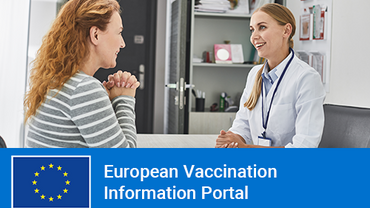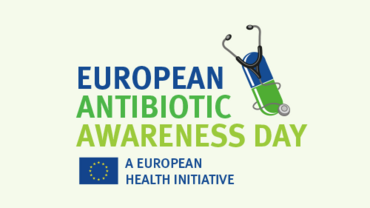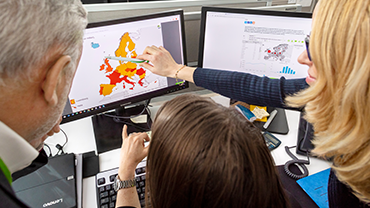ECDC marks 15 year anniversary
This week marks ECDC’s 15-year anniversary. ECDC, Europe’s agency for public health, became operational in May 2005, and has been working since to strengthen Europe’s defences against communicable diseases. As ECDC reflects on the progress and developments of the past 15 years, the COVID-19 pandemic is a constant reminder of how important it is for all countries in the EU/EEA to work together in response to public health threats.
About ECDC
The idea of creating a European public health agency emerged in 2003. In the aftermath of the SARS outbreak, it became clear that response measures, scientific advice and disease surveillance needed to be coordinated, not just at the national levels, but also at a central EU level.
ECDC’s main role as an agency of the European Union is to strengthen Europe’s defences against communicable diseases. Over the last 15 years, ECDC has been working together with all EU/EEA countries in response to public health threats and emerging diseases.
Highlights of ECDC's work
Vaccine coverage
Immunisation is a highly successful intervention to prevent communicable diseases with an evident need to sustain or achieve high vaccination coverage. However, decreasing coverage in some countries for important childhood vaccinations such as against measles, is threatening elimination plans as evidenced by outbreaks and very high numbers of cases in the years 2017 to 2019, in Europe.
ECDC has been working on vaccination issues from day one. In April 2020, ECDC launched the European Vaccination Portal, providing accurate, objective, up-to-date evidence on vaccines and vaccination in general. The Portal also provides an overview of the mechanisms in place in the EU that ensure that available vaccines conform to the highest standards of safety and effectiveness. The portal is a result of a cooperation between the European Commission, The European Medicines Agency, and ECDC.
Read more on the Vaccination Portal
Antibiotic resistance
Antimicrobials are the other important tools to curb the morbidity and mortality from infectious diseases. However, antibiotic resistance remains a major European and global public health problem. Tackling this complex issue requires a multi-faceted approach. Since 2008, ECDC has been partnering with numerous academic and scientific organisations, as well as the European Commission and the World Health Organization’s Regional Office for Europe to coordinate the European Antibiotic Awareness Day (EAAD), a European health initiative that promotes the prudent use of antibiotics. More than 43 countries in the European Region have so far conducted campaigns under the EAAD umbrella.
ECDC also promotes the One Health approach, a collaborative, multidisciplinary effort to attain optimal health for people, animals and the environment.
Read more on antibiotic resistance and EAAD
Whole genome sequencing
Whole genome sequencing is a major development that has rapidly transformed the way epidemiologists perform investigations and analyses. In particular, cross-border outbreak identification is facilitated by comparison of sequences, preferably through public accessible databases. ECDC has delivered strategies and frameworks for the integration of whole genome sequencing into European disease surveillance. Whole genome sequencing is now widely used for routine surveillance in the EU, and this has strengthened EU cross-border outbreak investigation and public health surveillance.
Hepatitis monitoring
Since its establishment, ECDC has been promoting the elimination of viral hepatitis.
In May 2020, the first monitoring report on the progress towards the elimination of hepatitis B and C across EU/EEA countries was published. The report represents a significant step towards establishing priority areas for action and also points out gaps in the national responses to hepatitis B and C. The collated EU data provide an important baseline to help map progress towards the WHO elimination targets and the United Nation’s Sustainable Development Goals.
Read more on monitoring progress towards the elimination of hepatitis B and C in the EU/EEA
International collaboration
International collaboration is key to increased health security through exchange of experience and information as well as support to countries to enhance their capacities and capabilities to detect, assess, respond, and prevent health threats caused by infectious diseases.
The Commission is ECDC’s closest partner. The Centre supports the Commission in the development of EU policies related to infectious diseases and follows up on their implementation (e.g. Decision No 1082/2013/EU of the European Parliament and of the Council of 22 October 2013 on serious cross-border threats to health). Lately, ECDC has been in close contact with the Commission to ensure a coordinated response to the spread of COVID-19 and provide objective information about the pandemic to the Member States and the European public.
ECDC has an excellent and sustained working relationship with European Parliament, in particular the European Parliament Committee for Public Health (ENVI).
ECDC also cooperates with the European Neighbourhood Policy (ENP) countries in order to establish technical cooperation and strengthen capacities in all areas of public health. ECDC wants to familiarise the ENP partner countries with EU standards, practices and legislation in the field of disease prevention and control.
ECDC was recently entrusted with additional resources to continue this work.
Read more on ECDC’s partnerships
ECDC’s establishment was sparked by the SARS outbreak, and nearly two decades later, ECDC’s future will certainly be influenced by the lessons learned from the COVID-19 pandemic.
"Health is not everything, but without health, everything is nothing."
— Arthur Schopenhauer, German philosopher, 1788–1860







